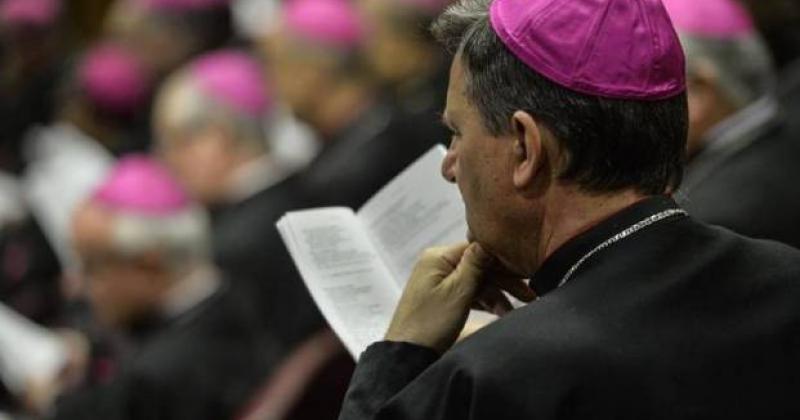Bishops are to continue to reflect on the issue of remarried divorcees. Governments should do more to promote the rights of families the Synod said, ahead of the publication of the “relatio synodi” this afternoon
“Christ wanted his Church to be a house with doors always open to welcome everyone,” without leaving anyone out. Hence bishops are called to “accompany couples and families and care for their personal and social wounds.” The message, which was approved by the Synod Fathers, illustrates the “challenges” of family pastoral care, including “the hardships of existence”.
The document takes its inspiration mainly from the Evangelii Gaudium and Francis’ feelings are shared by the majority of bishops, starting with his denunciation of the “fetishism of money and the dictatorship of the economy faceless and aimless truly human.” The document was approved by an overwhelming majority: 158 out of 174 voters.
At the introductory press conference, the President of the Pontifical Council for Culture, Gianfranco Ravasi, reiterated that it is an “open document, the fruit of frank discussions.” The message of the Third Extraordinary Assembly of the Synod of Bishops underlines that “failures give rise to new relationships, new couples, new civil unions, and new marriages, creating family situations which are complex and problematic, where the Christian choice is not obvious.” This is set against a background of an “enfeebled faith and indifference to true values, individualism, impoverishment of relationships, and stress that excludes reflection leave their mark on family life.”
Marital crises are “often confronted in haste and without the courage to have patience and reflect, to make sacrifices and to forgive one another”. The Synod has therefore appealed to governments and international organisations to “promote the rights of the family for the common good.” It praised “the generous faith of many families” and “conjugal love which … endures despite many difficulties.”
In the message approved today ahead of the Synod’s final vote, the fathers wrote: “In the first stage of our Synod itinerary, therefore, we have reflected on how to accompany those who have been divorced and remarried and on their participation in the sacraments.” The Synod also speared a thought for “children abused by those who ought to have protected them and fostered their development.”
In a news briefing, Vatican spokesman Fr. Federico Lombardi said: “Today, Cardinal Ravasi, President of the Pontifical Council for Culture, commented on the content of the message, informing that a series of spontaneous speeches were given on the message. Most of them expressed appreciation and presented proposals for improvements or modifications to a number of points, including some very specific points. In the evening, the commission worked on the message and presented the revised version this morning. This version was re-read, voted on and approved by an overwhelming majority of bishops.”
Fr. Antonio Spadaro, Editor-in-Chief of La Civiltà Cattolica, referred to the example Francis gave during a meeting with superior generals of religious orders, of a girl being adopted by a female couple. The Pope, the Jesuit said, recalled “the case of a very sad little girl who eventually confided in her teacher: “My mum’s girlfriend doesn’t love me.” Fr. Spadaro went on to say that “the situations we experience today therefore present new challenges which may sometimes be difficult for us to understand. How do we proclaim Christ to these boys and girls? How to announce Christ to a changing generation?” “The Pope,” Fr. Spadaro said, “sees the homosexuality issue as an important educational challenge.”
The newspaper published by the Italian Bishops’ Conference stressed that the Church is not afraid of internal debates. “The summaries of the discussions that have taken place over the past few days in the circoli minores, the different language groups (which were published to ensure transparency) portray the image of a Church that is not afraid to engage in internal debates or discuss the real experiences of families in the current global context. It is aware that new languages and new pastoral approaches are needed in order to reach and get close to everybody,” the Catholic newspaper highlighted in a comment by Stefania Fallasca. “The vexata questio of the administration of the sacraments to remarried divorcees,” Avvenire newspaper underlined, “was also discussed and what emerged what a willingness to look into this further, from a pastoral point of view too. Proposals are welcome but the doctrine on the indissolubility of marriage is to remain untouched.”
The message was very clear: “In the first stage of our Synod itinerary, therefore, we have reflected on how to accompany those who have been divorced and remarried and on their participation in the sacraments. We Synod Fathers ask you walk with us towards the next Synod,” the Ordinary Synod which is scheduled to take place in October 2015. “We offer you the words of Christ: “Behold, I stand at the door and knock. If anyone hears my voice and opens the door, I will enter his house and dine with him, and he with me.”
“On his journeys along the roads of the Holy Land, Jesus would enter village houses. He continues to pass even today along the streets of our cities. In your homes there are light and shadow. Challenges often present themselves and at times even great trials. The darkness can grow deep to the point of becoming a dense shadow when evil and sin work into the heart of the family.”
